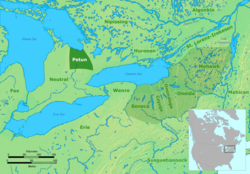Lingua hurón neutral
| Hurón neutral Attawandaron / Attiwandaronk | ||
|---|---|---|
| Falado en: | Canadá | |
| Rexións: | Ontario | |
| Extinción: | derradeira mención en 1671[1] | |
| Familia: | Americana Iroqués Iroqués do norte Hurón neutral | |
| Escrita: | latino | |
| Códigos de lingua | ||
| ISO 639-1: | --
| |
| ISO 639-2: | ---
| |
| Mapa | ||

| ||
| Status | ||
 | ||
A lingua hurón neutral (cuxo autoglotónimo era attawandaron / attiwandaronk) é unha lingua morta que pertence á familia iroquesa, e que foi falada outrora polo pobo neutral. O nome neutral, que lles deron os franceses, reflectiu o seu intento de manterse neutral nas guerras dos Castores. Os huróns chamábanlles attawandaron.
Mithun (1979:145, 188–189)[3] cita que os xesuítas consideraban a lingua hurón neutral como diferente da lingua wendat, xa que os neutrais eran "vne Nation differente de langage, au moins en plusieurs choses" (Thwaites 21:188)[4] / "unha nación diferente na lingua, cando menos en moitos aspectos" (Thwaites 21:189).[4] Mithun cita ademais o traballo de Roy Wright (Mithun 1979:160)[3] onde este último sinala a partir do nome neutral dado a Chaumonot que a lingua neutral non tivo cambios fonéticos que a distingan o wendat doutras linguas iroquesas do norte. Hanzeli (1969),[5] referenciando a Thwaites (21:228–230),[4][note 1] sinala que Brébeuf e Chaumonot consideraron o neutral o suficientemente diferente do wendat como para escribir unha gramática e un dicionario neutrais separados, agora perdidos.
Notas
[editar | editar a fonte]- ↑ (p. 228) "Ce fut sans doute vne prouidence de Dieu toute speciale, que le retardemẽt des Peres en ce lieu : car en vingt cinq iours qu'ils demeurerent en cette cabane, ils eurent le moyen d'ajuster le Dictionnaire, & les Peuples [sc. Regles] de la langue Huronne, à celle de ces Peuples, & faire vn ouurage qui seul meritoit qu'on fist vn voyage de plusieurs années dans le païs : nos Sauuages se plaisans beaucoup plus auec ceux qui parlent leur propre langue, qu'auec ceux qui n'en font qu'approcher, qu'ils tiennent iusques là pour estrangers." / (p. 229–230) "The delay of the Fathers in this place was, doubtless, an exceptional providence of God: for, in the twenty-five days that they remained in this cabin, they were able to harmonize the Dictionary and the Syntax of the Huron language with those of these Tribes, and accomplish a work which of itself would deserve that one make a stay of several years in the country, -- as our Savages take much more pleasure in those who speak their own language than in those who only attempt it, and whom they consider for that reason as strangers."
Referencias
[editar | editar a fonte]- ↑ "The Neutral Confederacy". The Canadian Encyclopedia
- ↑ Moseley, Christopher e Nicolas, Alexandre. "Atlas of the world's languages in danger". unesdoc.unesco.org. Consultado o 11 de xullo de 2022.
- ↑ 3,0 3,1 Mithun, Marianne (1979). "Iroquoian". En Campbell, Lyle; Mithun, Marianne. The Languages of Native America: Historical and Comparative Assessment. University of Texas Press. pp. 133–212.
- ↑ 4,0 4,1 4,2 Thwaites, Reuben G. (1896–1901). Jesuit Relations and Allied Documents. Burrows Brothers.
- ↑ Hanzeli, Victor Egon (1969). Missionary Linguistics in New France: a Study of Seventeenth- and Eighteenth-Century Descriptions of American Indian Languages. The Hague: Mouton de Gruyter. ISBN 3110995212.

